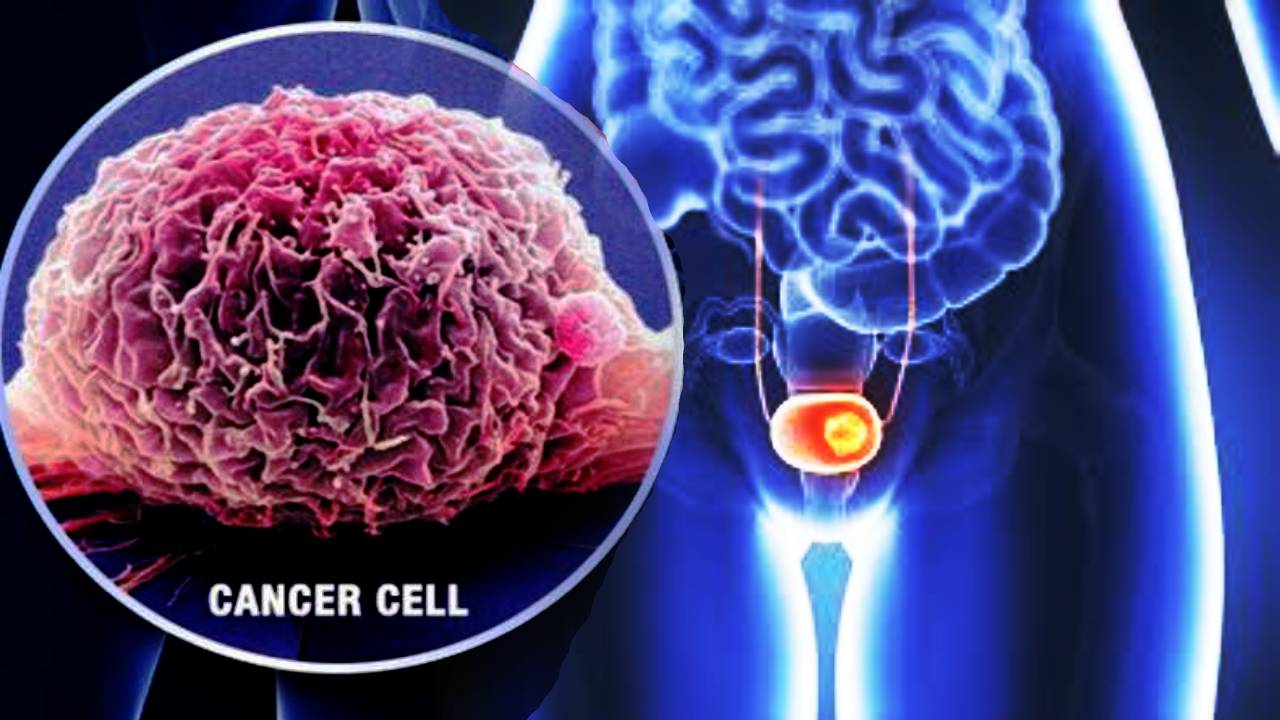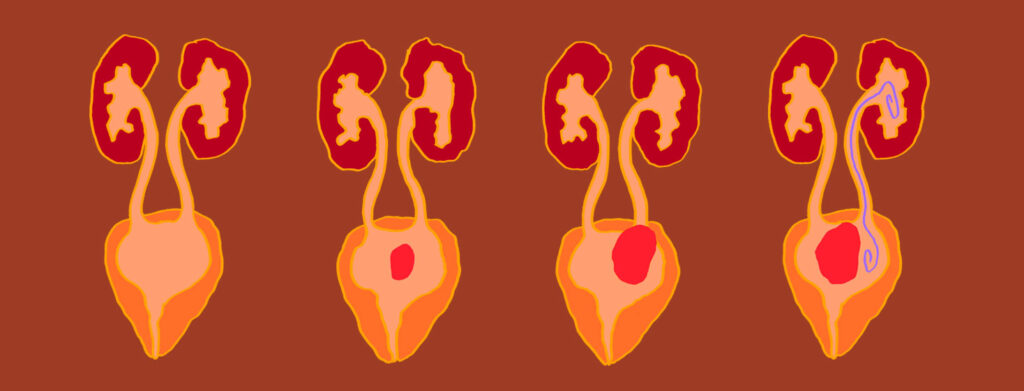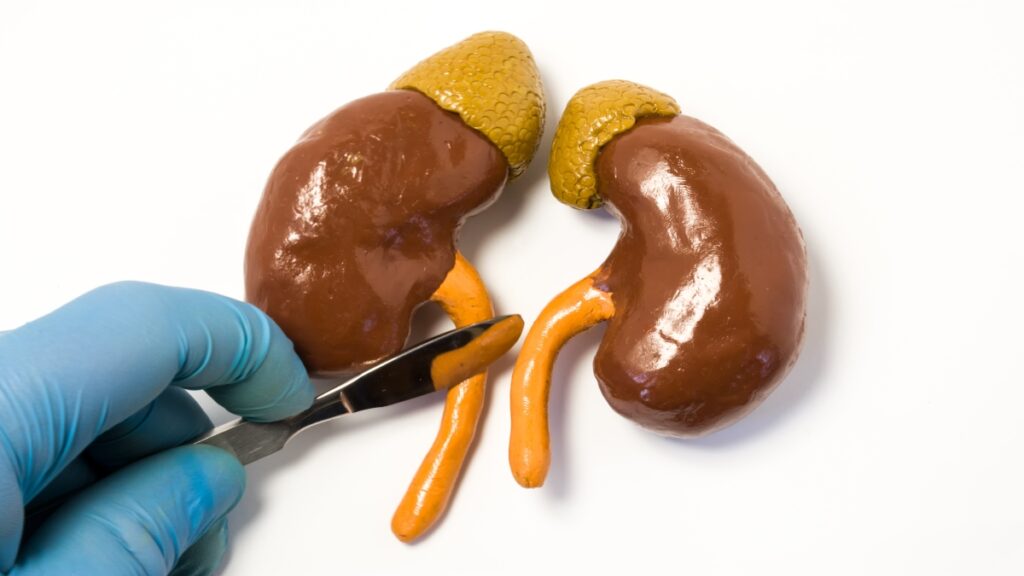WHAT IS URETERAL CANCER?
Cancer of the ureter (ureteral cancer) is an abnormal growth of cells on the inside lining of the tubes (ureters) that join your kidneys to your bladder. Ureters are part of the urinary tract, and they carry urine made by the kidneys to the bladder.
Ureteral cancer is unusual. It happens most often in older adults and in people who have previously been treated for bladder cancer.
Ureteral cancer is closely associated with bladder cancer. The cells that line the ureters are the same kind of cells that line the inside of the bladder. People diagnosed with ureteral cancer have a greatly increased risk of bladder cancer, so your doctor will suggest tests to look for signs of bladder cancer.
Treatment for ureteral cancer generally involves surgery. In certain situations, chemotherapy or immunotherapy might be suggested.

SYMPTOMS
Signs and symptoms of ureteral cancer are:
- Blood in urine
- Back pain
- Pain when urinating
- Losing weight without trying
- Fatigue
WHEN SHOULD YOU SEE A DOCTOR?
Book an appointment with your doctor if you have any persistent signs and symptoms that worry you.

CAUSES
It is not clear what causes ureteral cancer.
Ureteral cancer occurs when cells on the inside lining of the ureter develop changes (mutations) in their DNA. A cell’s DNA contains the information that tells a cell what to do. The changes tell the cells to multiply quickly and to continue living beyond their typical life cycle. The result is a growing mass of abnormal cells that could grow to block the ureter or spread to other areas of the body.
RISK FACTORS
Factors that could increase the risk of ureteral cancer include:
- Increasing age – The risk of ureteral cancer rises with age. Most people diagnosed with this cancer are 70 and 80 years old.
- Previous bladder or kidney cancer – People who have been diagnosed with bladder cancer or kidney cancer have an increased risk of developing ureteral cancer.
- Smoking – Smoking tobacco raises the risk of ureteral cancer, as well as other urinary tract cancers, including kidney cancer and bladder cancer.
- Family history of cancer – Lynch syndrome, also known as hereditary nonpolyposis colorectal cancer (HNPCC), increases the risk of colon cancer and other cancers, including ureteral cancer. If you have a strong family history of cancer, talk about this with your doctor. Together you might decide whether to consider genetic testing for Lynch syndrome and other inherited cancer syndromes.

DIAGNOSIS
Tests and procedures used to diagnose ureteral cancer are:
- Physical examination – Your doctor will ask you questions about your signs and symptoms and perform a physical exam to better understand your condition.
- Imaging tests – Imaging tests might be used to help your doctor assess the extent of your ureteral cancer. Imaging tests might include intravenous pyelogram or CT urography. In certain cases, a magnetic resonance urogram might be used if you cannot undergo CT imaging.
- Urine tests – You might undergo a urinalysis to analyze your urine for any abnormalities. A urine cytology test might be used to look for abnormal cells in a urine sample.
- Use of a thin, lighted tube to view the ureters – During a procedure known as ureteroscopy, your doctor will insert a slim, lighted tube equipped with a camera (ureteroscope) into your urethra. The scope is passed through your bladder and within your ureters.
Ureteroscopy enables your doctor to visually inspect your ureters and, if necessary, remove a tiny sample of tissue for lab testing (biopsy).
In the lab, a doctor who specializes in analyzing blood and body tissue (pathologist) will carefully check your cells for signs of cancer. This might include sophisticated analysis of the gene mutations involved in your cancer. - Tests for bladder cancer – Your doctor might check your bladder using imaging tests or a scope to see inside your bladder (cystoscopy) to look for signs of bladder cancer. People diagnosed with ureteral cancer are at high risk of developing bladder cancer. It might happen at the same time as your ureteral cancer or grow soon after treatment.

TREATMENT
Ureteral cancer treatment generally involves surgery. Your treatment options for cancer of the ureter will differ depending upon the size and location of your cancer, how aggressive the cells are, and your own goals and preferences.
Surgery
Surgery is usually recommended to remove ureteral cancer. The extent of your surgery will depend upon your situation.
For very early-stage ureteral cancer, surgery might involve removing only a part of the ureter. For more-advanced ureteral cancer, it might be necessary to remove the affected ureter, its associated kidney (nephroureterectomy), and a part of the bladder.
Chemotherapy
Chemotherapy is a drug treatment that uses chemicals to kill cancerous cells. Chemotherapy is occasionally used before surgery to shrink a tumor and make it easier to remove during surgery. Chemotherapy might be used after surgery to kill any cancer cells that might remain.
For advanced ureteral cancer, chemotherapy might be used to control the signs and symptoms of cancer.
Immunotherapy
Immunotherapy uses your immune system to fight against cancer. Your body’s disease-fighting immune system might not attack your cancer because the cancer cells produce proteins that help them hide from the immune system cells. Immunotherapy works by intruding with that process.
Immunotherapy may be an option for treating advanced ureteral cancer that has not responded to other treatments.
Follow-up examinations
After your treatment, your doctor will create a schedule of follow-up examinations to look for signs that your cancer has returned. These examinations also look for signs of bladder cancer, since people diagnosed with ureteral cancer have an increased risk of bladder cancer.
The tests you will undergo and the schedule of examinations will depend on your situation. But expect to see your doctor every few months for the first year and then less often after that.
If you or anyone you know is suffering from ureteral cancer, our expert providers at Specialty Care Clinics will take care of your health and help you recover.
Call us on (469) 545-9983 to book an appointment with our specialists.
